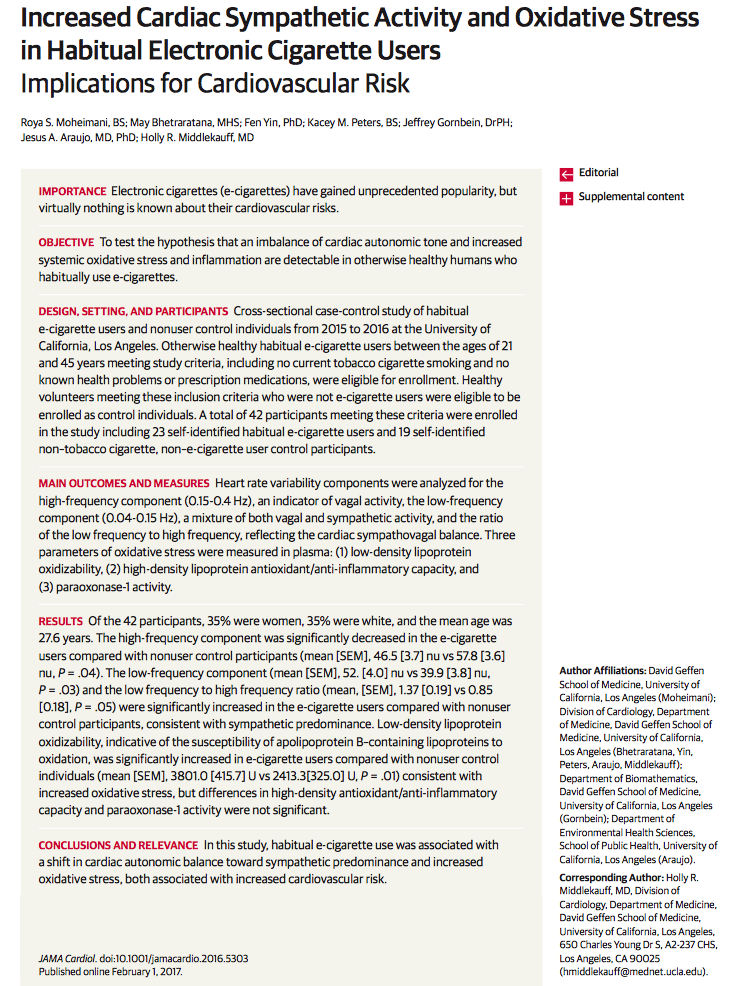Ridiculous. Transient physiological effects do not translate into little-understood heart disease which is a natural long-term degenerative process.

Here it is quick and to the point. In this clinical experiment, transient heart variability was detected between e-cig users and non-users. The researchers then extrapolated this result to heart disease based on the presumption that similar heart variability is observed in smokers who are supposedly at greater risk of heart disease. This is not credible because:
- No one knows what causes heart disease.
- Heart disease develops over a very long time.
- Heart disease is natural.
- While smoking increases the risk of lung cancer, its association with heart disease is tenuous. If nothing else, smokers tend to have unhealthy life styles that may very well encourage the progression of heart disease. So the effects (if any) of smoking on heart disease are impossible to tease out. Since smoking itself may very well have no association with heart disease, concluding that e-cigarettes are like cigarettes because of some transient physiological commonality is not supportable.
The media release and abstract are below.
###
Habitual e-cigarette use associated with risk factors linked to increased cardiovascular risk
THE JAMA NETWORK JOURNALS
In a study published online by JAMA Cardiology, Holly R. Middlekauff, M.D., of the David Geffen School of Medicine, University of California, Los Angeles, and colleagues examined whether habitual users of electronic cigarettes (e-cigarettes) are more likely to have risk factors associated with increased cardiovascular risk.
Electronic cigarettes, first marketed in the United States in 2006, have gained unprecedented popularity, especially among young people, but virtually nothing is known about their cardiovascular risks. This study included 23 habitual e-cigarette users (used most days for a minimum of one year) and 19 non-e-cigarette user control participants between the ages of 21 and 45 years who met study criteria, which included no current tobacco cigarette smoking and no known health problems.
The researchers found that habitual e-cigarette users were more likely than the nonsmoking control participants to have increased cardiac sympathetic activity (increased adrenaline levels in the heart) and increased oxidative stress, known mechanisms by which tobacco cigarettes increase cardiovascular risk.
The authors write that these findings have critical implications for the long-term cardiac risks associated with habitual e-cigarette use and mandate a reexamination of aerosolized nicotine and its metabolites. “Nicotine, which is the major bioactive ingredient in e-cigarette aerosol, with its metabolites, may harbor unrecognized, sustained adverse physiologic effects that lead to an increased cardiovascular risk profile in habitual e-cigarette users.”
The researchers note that they cannot confirm causality on the basis of a single, small study, and that further research into the potential adverse cardiovascular health effects of e-cigarettes is warranted.
###

Having some experience in medical studies myself, there are several sources of error not described above:
1. Conclusions based on the results of a cohort n = small sample size are of limited value.
2. E-cigarette use of duration t = 1y min is insufficient to demonstrate cardiac impacts.
3. Results not correlated to ethnicity.
4. Results not described for differences in diet, exercise, or other associated risk factors (such as familial predisposition).
In other words, they went into this study on the assumption that e-cigarettes raise overall cardiovascular risk, and massaged the data to “prove” it. That’s not science—it’s an agenda.
Hi,
I have been seeing a cardiologist once a year regarding my heart. Five years ago he wanted to put a camera up into my arteries to see what the problem was, I smoked 25-30 cigarettes a day at that time.
Obviously he wanted me to stop smoking. I tried and failed many times, after 47 years it’s not easy. Two years ago I started using a Vapouriser on the suggestion of my niece who could see I was struggling.
Fast forward to my stress test ECG a couple of months ago and to everyones delight and relief it was normal for the first time in five years.
You can draw your own conclusions from this but one thing you would have to say is that using a Vapouriser didn’t make matters worse, although I tend to think it is the reason for the big improvement.
But not only is my heart function now normal my breathing is also much improved, gone is the smokers hacking cough plus I have more energy, in fact you could say I have my life back.
Yours
RexAlan
All the statements you made about heart disease are true. The amount that is not known about heart disease is staggering. One of the chief reasons for this level of ignorance is that almost all the research on the topic has been centered around the risk factor paradigm for the causation of disease. As I am sure you and all devoted readers of this website are aware, this approach has proven to be scientifically bankrupt. I would add one further statement to your list: we do not even know the true incidence of heart disease. Death certificate diagnoses are the source for practically all “statistics” on heart disease and are used in most “studies” despite a voluminous literature documenting the worthlessness of these “cause of death” diagnoses. Is the 90 year old who dies in his sleep really a victim of heart disease? The odds are overwhelming that this will be the cause of death listed on the death certificate.
Looks like politics has invaded JAMA – yet again
When was the last time your GP, Internist or Cardiologist sent you for high-frequency component or low-frequency component numbers?
just askin’
I miss the blog Junk Food, for articles like this one. Thank you for posting!